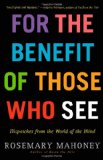Summary | Excerpt | Reviews | Beyond the Book | Readalikes | Genres & Themes | Author Bio

Dispatches from the World of the Blind
by Rosemary Mahoney
I sat in the back of the taxi with my hand held lightly over the bandage. The familiar streets sliding hazily by before my good eye looked only half familiar, and in my heart I knew that I would spend the rest of my life this way, seeing everything in monovision, missing half my visual perception and therefore half the world.
This happened thirty years ago but I still remember the doctor's last name: Cobb. Dr. Somebody Cobb. He was youthful and fit and by coincidence he knew my mother, had examined her eyes just a few months before, a fact that I found inordinately comforting. I remember that he put an anesthetic in my eye to numb it, dilated both my pupils with eye drops that streamed down my cheeks, pressed my face into a thing like a stereoscope, shone bright little lights into my eyes, and, finally, pronounced the cornea deeply torn. It would take several weeks for it to heal itself. He taped a patch over my eye and released me.
Because both my pupils had been dilated, when I left Cobb's office, everything was a mushy blur. Even my healthy unpatched eye was useless. A nurse accompanied me through the revolving front door of the hospital, wherein I caught my sneaker between the moving door and the jamb, lurched forward, and banged my forehead smartly on the glass, an indignity that under any other circumstances would not have made me cry but that under these circumstances— insult added to injury—brought hot tears of frustration to my helpless eyes. The nurse said, There, there, now, with a not unkindly hint of riddance and handed me over to a taxi driver, who guided me by the elbow from the spinning door of the hospital, through the jumbled darkness, and into the backseat of the car. The cold seat shocked my bare legs as I slid myself onto it. As the driver drove me back to my apartment in Inman Square, the lights of the city smeared past the wet car window. Once home, I stumbled my way immediately to bed.
I remember the depth of the gloom I felt as I lay there that night. It wasn't the unfathomable pain I experienced every time I moved my eye right or left or up or down but the certainty that my eye would never be right again. It made no difference that the doctor had said the cornea would heal. I didn't believe him. How ignominious to be blinded by a squash racquet. How ignominious to be blinded by anything at all. What horrible luck. It gave me a dank, sinking feeling of dread. I imagined being totally blind forever and how unbearable that would be and began to panic a little.* To be blind would be to become one of those people I had always pitied and slightly feared, one of those people who through no fault of their own had been deprived of their vision and, thus, their real enjoyment of life, their effectuality, their potential. That it was no fault of their own somehow made the tragedy worse.
Most of us who have healthy eyesight are extremely attached to our vision, often without being conscious that we are. We depend heavily on our eyes and yet we rarely give them a second thought. I, at least, am this way. The physical world is almost hypervivid to me. The appearance of objects is registered instantly and boldly in my mind with no conscious effort on my part. I cannot help noticing tiny details. I have a friend—and not a stupid one—who once spent an entire lunch with a man and never noticed until the very end of it when she moved to shake his hand that he was missing his right arm. How, I have several times asked her with real bafflement, was that possible? Such a thing could simply never happen to me. Ever. I would have noticed within fifteen seconds if that man was missing merely a button on a shirt cuff. I would have noticed whether he had hair in the spaces between his knuckles, would have noticed the length of his fingernails and exactly what shape the fingernails were. I would have noticed the color of his eyebrows, the size of his ears, the condition of his teeth, the quality of his hair and skin, and all of this without making a conscious effort to do so. If one person in a group of ten is missing the tip of his little finger, I will notice it almost immediately.
Excerpted from For the Benefit of Those Who See by Rosemary Mahoney. Copyright © 2014 by Rosemary Mahoney. Excerpted by permission of Little Brown & Company. All rights reserved. No part of this excerpt may be reproduced or reprinted without permission in writing from the publisher.
What really knocks me out is a book that, when you're all done reading, you wish the author that wrote it was a ...
Click Here to find out who said this, as well as discovering other famous literary quotes!
Your guide toexceptional books
BookBrowse seeks out and recommends the best in contemporary fiction and nonfiction—books that not only engage and entertain but also deepen our understanding of ourselves and the world around us.